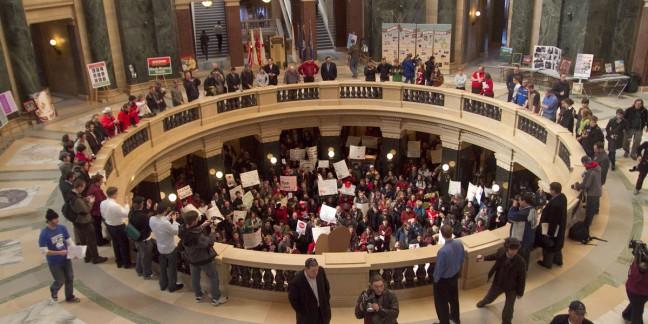Often shrouded in the complexity of labor law and regulations, labor unions can serve as integral resources for public employees seeking wage negotiations or other basic workplace benefits. Unionizing was of course more widely practiced during times where working conditions were drastically poorer than they are today, but for hundreds of thousands of Wisconsin employees, unions are a lifeline to basic benefits. Among the numerous benefits resultant of unions, collective bargaining, or the negotiation of wages or other conditions of employment as a group of employees, is perhaps most central. Without collective bargaining, employees would effectively have no voice to negotiate terms of their own employment, rendering them at the mercy of contractual stipulations.
In an attempt to shrink the monumental deficit of 2011, Gov. Scott Walker implemented his signature Act 10 Bill, one which dramatically shifted the protocol for various employment benefits such as pensions, health insurance and collective bargaining. Under Act 10, collective bargaining for wages was severely limited for public employees, with wages not permitted to exceed a cap based on consumer price index. Unions were now required to take an annual vote to maintain certification as a union at all. Finally, employers were no longer required to collect union dues, and members of collective bargaining units would not be required to pay dues, a significant shift from previous protocol. In essence, existing as a union became much more difficult, wage negotiations were significantly hindered and dues which keep unions afloat were effectively eliminated.
Union leader discusses organized labor’s role in preventing climate change
While the bill was designed to shrink the massive, $3.6 billion budget deficit, union members across the state responded passionately, asserting the bill’s strategy took too much away from the ordinary worker — workers Walker had propped up throughout his campaigns for governor. Reaching a zenith, protesters claimed the bill was not only detrimental and a poor governmental decision, but that it was unconstitutional. Leading the charge in such organized protests was the University of Wisconsin’s own Teaching Assistants’ Association, a union of its own protesting the effects of Act 10. This assertion was based on the fact that Act 10 effectively deemed what employees could or couldn’t negotiate, seen as a violation of each American’s first amendment rights. While these accusations were widespread, none of them gained much traction, and Act 10 is still the law of the land.
Now, two Wisconsin labor unions are filing an official lawsuit against Walker, as a Supreme Court case may grant those previous accusations of constitutionality some weight. The case, Janus v. AFSCME Council 31, centers around Illinois child support specialist Mark Janus, who is arguing to overturn previous Supreme Court ruling in Abood v. Detroit Board of Education, which upheld that employees under union contract were required to pay union dues but said dues could not be used for political purposes. Janus argues that requiring employees to pay union dues regardless of whether or not the employee agrees with the eventual usage of said dues is unconstitutional and doesn’t allow employees to take necessary action or inaction.
Teachers hold immense governing power before gubernatorial elections
Janus asserts the majority of union bargaining is aimed towards government officials to take action, and if Janus does not politically support such action, he should be granted the right to abstain from certain fees. In short, if the court rules in favor of Janus, which they’re expected to do, union speech would be considered universally political, and Wisconsin unions will be able to argue“all union speech directed to the government will be considered inherently political in nature, indistinguishable from lobbying the government.” Therefore, unions will have a strong case for the unconstitutionality of Act 10, saying “the right of freedom of thought protected by the First Amendment against state action includes both the right to speak freely and the right to refrain from speaking at all.” Basically, since Act 10 limits a union’s ability to organize via collective bargaining, it infringes on their first amendment rights outright, raising questions about the future of the legislation.
One of the primary concerns associated with the Supreme Court case is that, should the court rule in favor of Janus, it sets a precedent for public employees to essentially reap the benefits of union membership without paying the necessary dues, both harming the affluence of unions and establishing a pattern of essentially free benefits.
Protests in historically red states indicate importance, urgency of labor politics
This is a genuine concern, however it’s important to recognize that union membership has been on the sharp decline since Act 10’s introduction. Between 2011 and Feb. of 2012, union membership among public employees plummeted from more than 60,000 to around 29,000. As such, a ruling in favor of Janus may seem like a step backwards for the future of unions in this country. But, in reality, such a ruling could do wonders for the state of Wisconsin, considering if Act 10 is deemed unconstitutional, or at least deemed worthy of critical reform, we may see union membership eventually climb back up.
While unions may not play an enormous role in today’s Wisconsin, the Supreme Court’s eventual June decision could pave the way for changes to Act 10 that are long overdue.
Lucas Johnson ([email protected]) is a sophomore majoring in journalism and strategic communication.




















